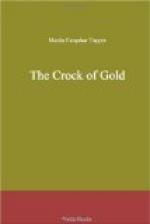Sweet Grace Acton, we will not vex thy blushing maiden modesty by elaborate details of form, and face, and feature. Perfect womanhood at fair eighteen: let that fill all the picture up with soft and swelling charms; no wadding, or padding, or jigot, or jupe—but all those graceful undulations are herself: no pearl-powder, no carmine, no borrowed locks, no musk, or ambergris—but all those feeble helps of meretricious art excelled and superseded by their just originals in nature. It will not do to talk, as a romancer may, of velvet cheeks and silken tresses; or invoke, to the aid of our inadequate description, roses, and swans, and peaches, and lilies. Take the simple village beauty as she is. Did you ever look on prettier lips or sweeter eyes—more glossy natural curls upon a whiter neck? And how that little red-riding-hood cloak, and the simple cottage hat tied down upon her cheeks, and the homely russet gown, all too short for modern fashions, and the white, well-turned ankle, and the tidy little leather shoe, and the bunch of snow drops in her tucker, and the neat mittens contrasting darkly with her fair, bare arms—pretty Grace, how well all these become thee! There, trip along, with health upon thy cheek, and hope within thy heart; who can resist so eloquent a pleader? Haste on, haste on: save thy father in his trouble, as thou hast blest him in his sin—this rustic lane is to thee the path of duty—Heaven speed thee on it!
More slowly now, and with more anxious thoughts, more heart-weakness, more misgiving—Grace approacheth the stately mansion: and when she timidly touched the “Servants’” bell, for she felt too lowly for the “Visiters’,”—and when she heard how terribly loud it was, how long it rung, and what might be the issue of her—wasn’t it ill-considered?—errand—the poor girl almost fainted at the sound.
As she leaned unconsciously for strength against the door, it opened on a sudden, and Jonathan Floyd, in mute amazement, caught her in his arms.
“Why, Grace Acton! what’s the matter with you?” Jonathan knew Grace well; they had been at dame’s-school together, and in after years attended the same Sunday class at church. There had been some talk among the gossips about Jonathan and Grace, and ere now folks had been kind enough to say they would make a pretty couple. And folks were right, too, as well as kind: for a fine young fellow was Jonathan Floyd, as any duchess’s footman; tall, well built, and twenty-five; Antinous in a livery. Well to do, withal, though his wages don’t come straight to him; for, independently of his place—and the baronet likes him for his good looks and proper manners—he is Farmer Floyd’s only son, on the hill yonder, as thriving a small tenant as any round abouts; and he is proud of his master, of his blue and silver uniform, of old Hurstley, and of all things in general, except himself.
“But what on earth’s the matter, Grace?” he was obliged to repeat, for the dear girl’s agitation was extreme.




